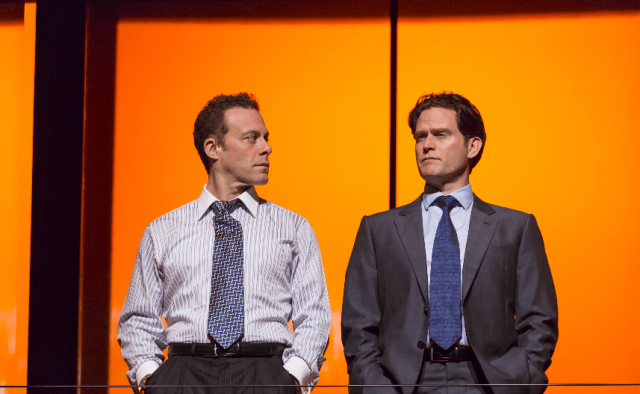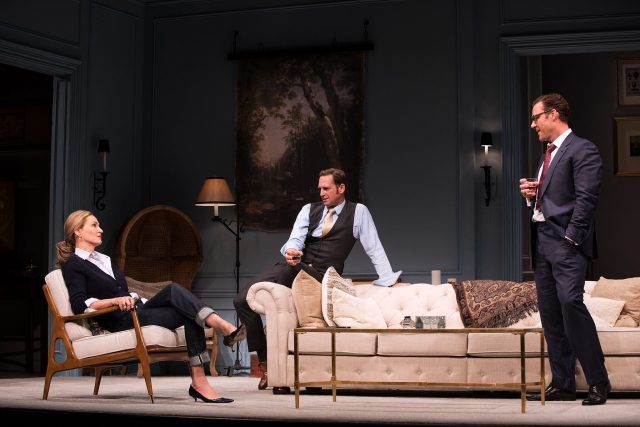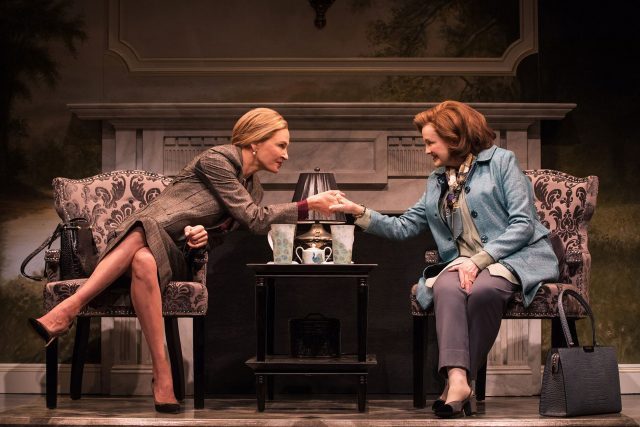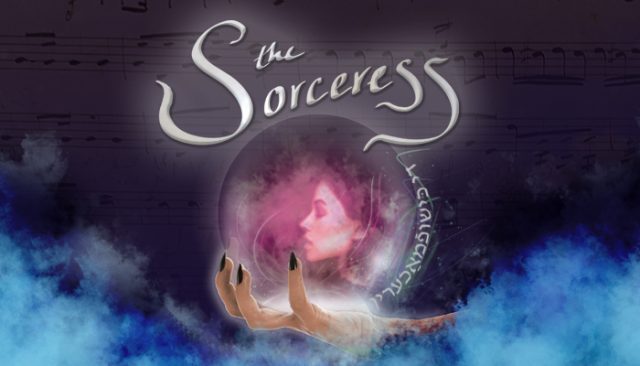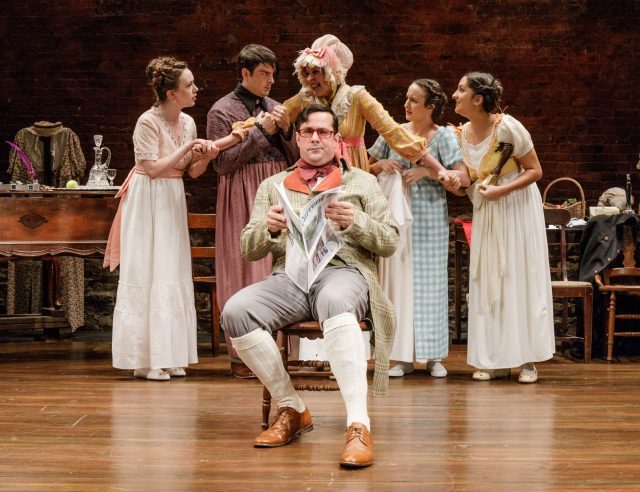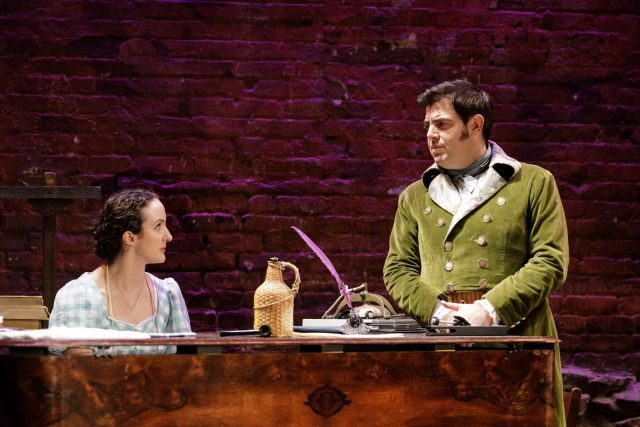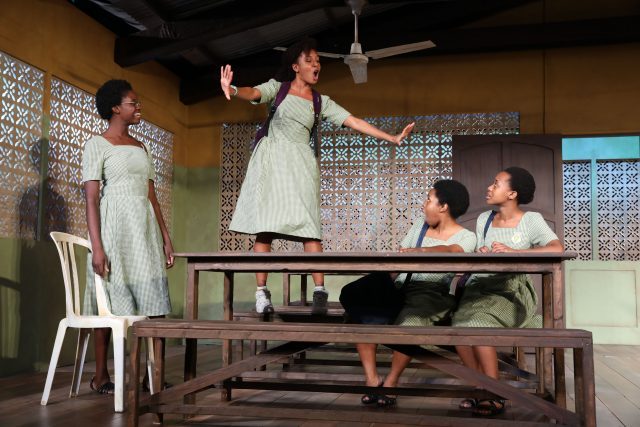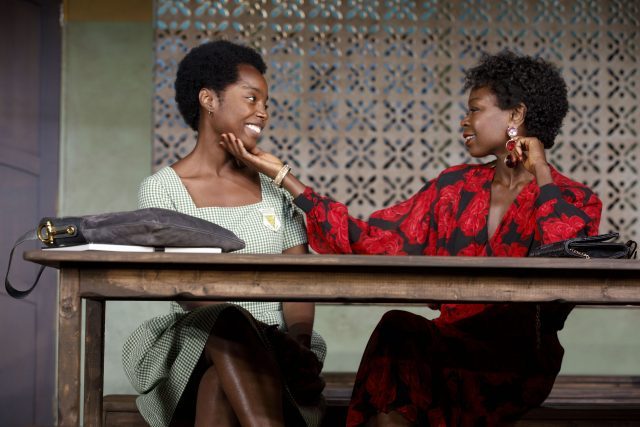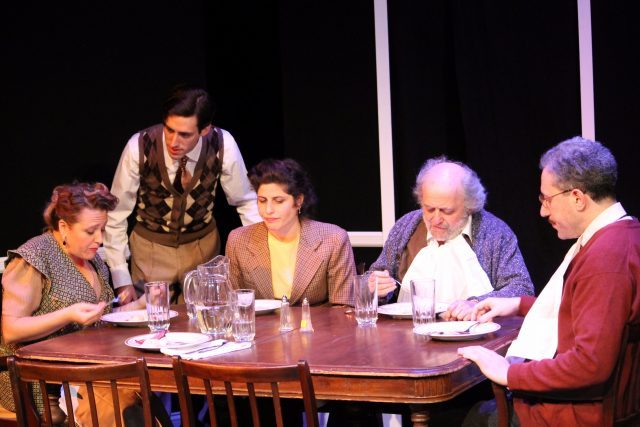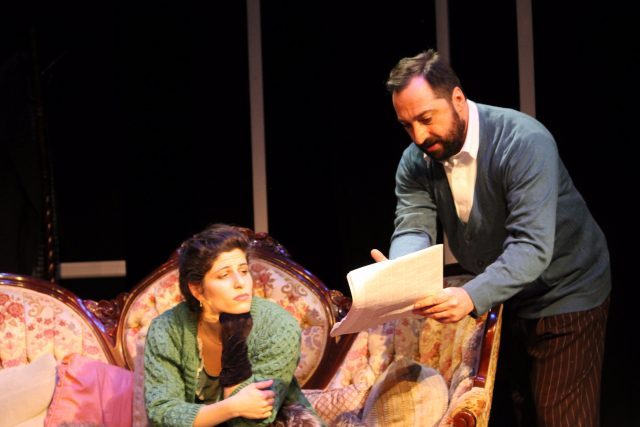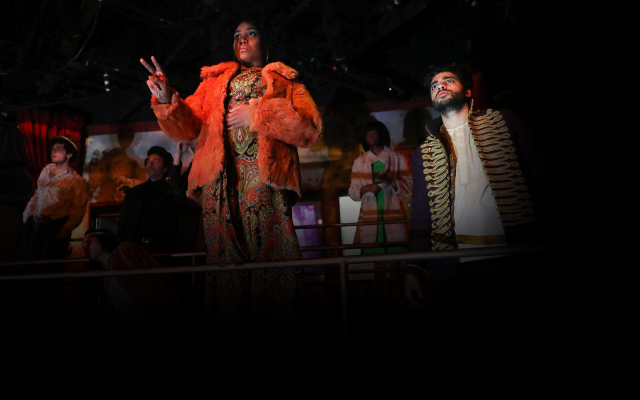
The Hendrix Project kicks out the jams at the BRIC House as part of the Public Theater’s Under the Radar festival (photo by Nicolas Savignano)
Once upon a time, January was considered a relative artistic wasteland, as people suffered from a post-holidays letdown with a dearth of high-quality movies and Broadway shows opening up. But this century continues to fill that void with more and more cutting-edge, experimental, and offbeat music, dance, and theater with a growing list of performance festivals around the city. You can catch cabaret at Pangea, opera at Prototype, dance at American Realness, the 92nd St. Y, and New York Live Arts, jazz at JazzFest, Irish theater at Origin’s 1st, and a little of everything at Under the Radar and COIL, the latter back where it belongs at the renovated PS122. Below are only some of the highlights of this exciting time to try something that might be outside your comfort zone and take a chance on something new and different to kick off your 2018, especially with the majority of tickets going for about twenty-five bucks.
UNDER THE RADAR
Public Theater and other venues
425 Lafayette St. by Astor Pl.
January 4-15
www.publictheater.org
After by Andrew Schneider, performed by Alicia ayo Ohs and Andrew Schneider, with Kedian Keohan and Peter Musante, January 4, 6, 7, 8, 11, 13, 14, Public Theater, Martinson Hall, $25
Parallel Lives: Billie Holiday & Edith Piaf, created and directed by Nona Hendryx, performed by Joey Arias, Tamar Kali, Liza Jesse Peterson, and Etienne Stadwjck, January 5-6, Joe’s Pub, $45
The Gates: An Evening of Stories with Adam Gopnik, January 5, 10, 12, 13, 14, Public Theater, Newman Theater, $25
The Hendrix Project, by Roger Guenveur Smith & CalArts Center for New Performance, performed by Samantha Barrow, Morgan Camper, Hannah Cruz, Jasmine Gatewood, Heaven Gonzalez, Ariyan Kassam, Liam O’Donnell, Dante Rossi, Henita Telo, Max Udell, Ieva Vizgirdaite, and Christopher Wentworth, January 11-14, BRIC House, $25
Pursuit of Happiness, Nature Theater of Oklahoma & EnKnapGroup, NYU Skirball, January 12-14, $25
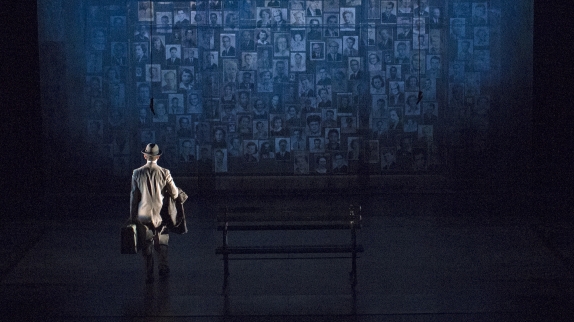
Gregory Spears and Greg Pierce’s Fellow Travelers goes back to the Lavender Scare of the 1950s (photo by Philip Groshong)
PROTOTYPE
Multiple venues
January 7-20
www.prototypefestival.org
Acquanetta, by composer Michael Gordon, librettist Deborah Artman, director Daniel Fish, and conductor Daniela Candillari, with Mikaela Bennett, Amelia Watkins, Eliza Bagg, Timur, and Matt Boehler, Gelsey Kirkland Arts Center, January 9-13, $30-$75
Out of Bounds — Breaking Ice: The Battle of the Carmens, by Alicia Hall Moran, new vocal work for an ice-skating audience, January 11, Bank of America Winter Village at Bryant Park, free, 1:40; January 14, location TBD, free, 2:30
Fellow Travelers, by composer Gregory Spears, librettist Greg Pierce, director Kevin Newbury, and conductor George Manahan, with Aaron Blake, Joseph Lattanzi, Devon Guthrie, Vernon Hartman, Marcus DeLoach, Christian Pursell, Paul Scholten, Alexandra Schoeny, and Violetta Lopez, January 12-14, Gerald W. Lynch Theater at John Jay College of Criminal Justice, $30-$55
Out of Bounds: The Future Is Open, by Tori Wrånes, newly commissioned site-specific work, Washington Square Park, Northwest Corner, January 18-19, free, 5:30
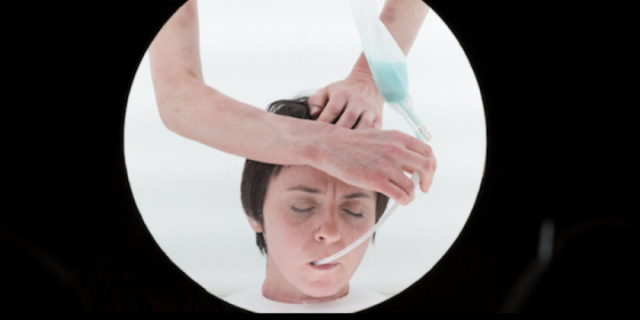
Michelle Ellsworth’s The Rehearsal Artist promises an intimate experience at American Realness
AMERICAN REALNESS
Abrons Arts Center and other venues
466 Grand St. at Pitt St.
January 9-16
americanrealness.com
The Rehearsal Artist, by Michelle Ellsworth, January 9-11, the Invisible Dog Art Center, $25, 1:15 – 8:45
Variations on Themes from Lost and Found: Scenes from a Life and Other Works by John Bernd, by Ishmael Houston-Jones and Miguel Gutierrez, with Nick Hallett and Jennifer Monson, Danspace Project, January 9, 11, 12, 13, $22-$25
#PUNK, by nora chipaumire, Abrons Arts Center Playhouse, January 11-13, $25
I <3 PINA, by Neal Medlyn, Abrons Arts Center Experimental Theater, January 11, 12, 13, 14, 16, $25
This, by Adrienne Truscott, Abrons Arts Center Playhouse, January 14-16, $25

ORIGIN’S 1st IRISH FESTIVAL
Multiple venues
January 9-29
www.1stirish.org
Dyin’ for It, by Derek Murphy, with Maria Deasy, Adam Petherbridge, Sarah Street, and Aoife Williamson, the Cell, January 17-28, $30
Guy Walks into a Bar, by Don Creedon, New York Irish Center, January 18, 25, $20-$25, 7:15
ShakesBEER with an Irish Twist, pub crawl, Stone St., January 27, February 3, $49 (includes four drinks), 3:00
Dear Mr. Beckett: Letters from the Publisher, with Billy Carter and Olwen Fouéré, the Irish Consulate, January 29, free with advance RSVP, 1:00
WINTER ALT-FEST
Pangea NYC
178 Second Ave.
January 10-16
www.pangeanyc.com
Salty Brine: How Strange It Is, January 10, 17, 24, 31, February 7, $20, 7:30
Penny Arcade: Longing Lasts Longer, January 11, 14, $20, 7:00
Sven Ratzke: From Amsterdam to Mars, January 14, $20, 9:00
Tammy Faye Starlite: An Evening of Light, Tammy Faye channels Nico, accompanied by Keith Hartel, January 16, $20, 7:00
WINTER JAZZFEST NYC
Multiple venues
January 10-17
www.winterjazzfest.com
Gilles Peterson hosts British Jazz Showcase, with the Comet Is Coming, Nubya Garcia, Yazz Ahmed, and Oscar Jerome, Le Poisson Rouge, January 10, $20-$25, 7:00
Winter JazzFest Marathon, more than fifty artists at eleven venues, January 12-13, $50-$60 one day, $85-$95 both days
Ravi Coltrane Presents Universal Consciousness: Melodic Meditations of Alice Coltrane, Le Poisson Rouge, January 14, $35-$45, 7:00
A Tribute to Geri Allen, with Angela Davis, Esperanza Spalding, Craig Taborn, Dee Dee Bridgewater, Farah Jasmine Griffin, Ingrid Jensen, Jack DeJohnette, Jaimeo Brown, Jeff Tain Watts, Kassa Overall, Kris Davis, Linda May Han Oh, Maurice Chestnut, Mino Cinelu, Ravi Coltrane, S. Epatha Merkerson, Tia Fuller, Vijay Iyer, and others, benefit for the Geri Allen Estate, the New School Tishman Auditorium, January 15, $35-$100
Deerhoof Meet Wadada Leo Smith and Nicole Mitchell: Maroon Cloud, Le Poisson Rouge, January 17, $25-$35, 8:00
COIL
Performance Space 122
150 First Ave.
January 10 – February 4
www.ps122.org/coil-2018
Body of Work, by Atlanta Eke, PS122, January 10-11, $25
visions of beauty, by Heather Kravas, PS122, January 10-13, $25
Jupiter’s Lifeless Moons, by Dane Terry, PS122, January 12, 13, 14, 16, 17, $25
he his own mythical beast, by David Thomson, PS122, January 31, February 1, 2, 4, $25
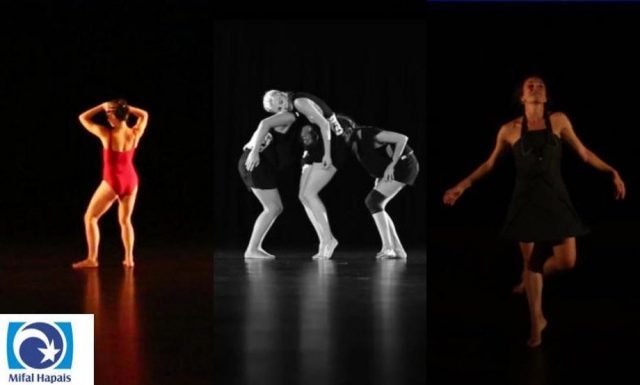
Our of Israel returns to the 92nd St. Y for its eighth season
OUT OF ISRAEL: 70 YEARS OF ISRAEL, 70 YEARS OF DANCE / OPEN DOORS: 92Y HARKNESS DANCE CENTER ARTISTS IN RESIDENCE SHOWCASE
92nd St. Y
www.92y.org
Out of Israel: works by choreographers Itzik Galili and Roi Assaf performed by Troy Ogilvie, a solo by Roni Chadash, a new composition by DANAKA collective, and films by Joseph Bach and Shamel Pitts, guest curated by Dana Katz, January 12 at 12 noon and January 13 at 8:00, $10 in advance, $20 at the door
Open Doors: works by choreographers Joanna Kotze, Kensaku Shinohara, Pam Tanowitz, and Larissa Velez-Jackson with Jillian Peña, January 12 at 8:00 and January 13 at 4:00, $25-$29

Jack Ferver will present his work-in-progress Everything Is Imaginable as part of Live Artery at New York Live Arts
LIVE ARTERY
New York Live Arts
219 West 19th St.
January 13-15
newyorklivearts.org
Saturday, January 13, $10 each
Abby Zbikowski, abandoned playground (excerpt), 12 noon; Kimberly Bartosik, I hunger for you (work-in-progress), 2:00; RoseAnne Spradlin, “X,” 3:00; Netta Yerushalmy, Paramodernities (work-in-progress), 5:00; Susan Marshall, Construction (collaboration with So Percussion) and Closed System (work-in-progress), 6:00; Walter Dundervill, Skybox (excerpt), 7:00
Sunday, January 14, $10 each
Joanna Kotze, What will we be like when we get there (work-in-progress), 1:00; Kota Yamazaki, Darkness Odyssey Part 2: I or Hallucination (excerpt), 4:00; Bill T. Jones/Arnie Zane Company, The Deep Blue Sea, 5:00; Deborah Hay/Eric Geiger, Jess Humphrey & Leslie Seiters, Pause, 6:00; RoseAnne Spradlin, “X,” 8:00; Jack Ferver, Everything Is Imaginable (work-in-progress), 8:30
Monday, January 15, $10 each
Netta Yerushalmy, Paramodernities (work-in-progress), 11:00 am; Jennifer Nugent & Paul Matteson with Ted Coffey, Visual Proof, 1:00; Jack Ferver, Everything Is Imaginable (work-in-progress); 3:30; Joanna Kotze, What will we be like when we get there (work-in-progress), 5:00; Kimberly Bartosik, I hunger for you (work-in-progress), 6:30

